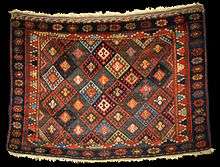Jaff
The Jaff people (also Jahf, Jaaf, Jaf, Caf or جاف) are native to the northern and central Zagros area, which is divided between Iran and Iraq. The Jaff tribe originated in the year 1114 by Kurdish King Zaher Beg Jaff. The Jaff dialect (called Jaffi) is part of Sorani, a south-southeastern branch of Kurdish language family. The region inhabited by this tribe is southwest of Sanandaj all the way to Javanroud, and also areas around the city of Sulaimaniyah in Southern Kurdistan. Once nomadic, the Jaff have more recently settled into a predominantly agricultural way of life and are often known as the most educated and intellectual tribe of the Kurds.
Geographic distribution and clans
Total population of the tribe is estimated at 3 to 5 million people in both Iraq and Iran. At present, they are settled mainly in Sulaimaniya Governorate of Iraq, especially Halabja and Kalar as well as in the Kermanshah region of Iranian Kurdistan.
History
The West began ties with the Jaff tribe during World War I, when Ely Bannister Soane established contact. After the war, the tribe opposed Sheikh Mahmud Barzanji, as well as Great Britain’s failure to grant Kurdish autonomy in Iraq. Post-World War II, the Jaff tribe has decreased in importance due to changes in borders, governments and tribal settlements.
Saddam Hussein's chemical attack on Halabje on March 16, 1988 killed at least 5,000 people and injured or sickened 7,000 more. The majority of these victims were Jaff tribe members.
Notable members
- Leaders and politicians
- Abdel-Qader al-Jaff, Arbil mayor 1989
- Adela Jaff (1847–1904), called Princess of the Brave by the British; married Kurdish King Osman Pasha Jaff, was famous for her role in the region, namely in the era of Shiekh Mahmood Al-Hafeed.
- Akram Jaff (1929-2010), writer, Iraqi Minister of Agriculture in 1965. He resigned to protest against the atrocities committed by the Iraqi Army in Kurdistan. Ambassador of Iraq in Rome 2004-2008.
- Jabir al-Jaff, Judge in the Kirkuk Court
- Jalal Jaff, 1st Secretary of the Chinese Embassy 1960
- Jawhar Namiq Salm (Jaff), Nickname; (Salim Sorani) political and military leader of the Kurdish revolution (Gulan), he was first president of the Kurdistan National Assembly in 1992, writer and philanthropist.
- Mahmood Pasha Jaff, Kurdish King and supreme chief of the Jaff tribe, stayed in Constantinople as a 'honorary detainee' for two years in 1892-1894 in a house in Beşiktaş
- Mahmud Pasha Jaff was born in 1845 E.C. He had been the vessel in which his father Mohamed Pasha Jaff had fulfilled his lifetime quest, which was the destruction of the Baban clan and archrival to the throne of the Jaff clan, his cousin Aziz Bey Jaff, who was a puppet to the Baban.
- Mawlana Khalid (Khâlid-i Baghdâdî) (c. 1778–1826), a Kurdish Sufi who in the early 19th century brought the Naqshbandi Sufi order to Kurdistan.
- Mohamed Pasha Jaff, a Kurdish King and supreme chief of the Jaff tribe, he built Sherwana Castle in 1734.
- Mohammed Amin Al-Jaff, Ambassador to Japan 1986 and Ambassador to China 1991
- Muhammad Beg Jaf, MP Kirkuk 1976
- Osman Pasha Jaff, a Kurdish King, who married Adela Khanum of the old Ardalan family.
- Salar Al-Jaff, hanged for being a convicted Persian Shah supporter
- Sirwan Abdullah Jaff, chairman of the executive council for the autonomous region
- Scholars and poets and artists
- Abdulla Goran (1904-1962), the father of modern Kurdish literature
- El-Begi Jaf (1493–1554), poet born in Sharazor, who wrote in the Gorani dialect
- Hanna Jaff (born 1986), Deputy Secretary of Immigrants in the Institutional Revolutionary Party in Mexico, and Honorary Representative of Garmiyan in Latin America
- Keffee Effendi, scholar in Kurdish, Turkish, Arabic, and Persian

- Khanai Qobadi (ca.1700-1759), an 18th-century Jaff poet
- Nalî (1797 or 1800-1855 or 1856), poet who contributed to making Sorani the literary language of southern Kurdistan
- Tara Jaff (born 1958), musician specializing in harp
- Burhan Namiq Salm Jaf (born 1955), political. Ambassador of Iraq in Athens, Greece.
- Paywand Jaff, born 1968, singer.
Jaff rugs
The Jaff tribe is known for their rugs, woven on 3 to 4 feet (0.91 to 1.22 m)-wide looms and usually twice as long as they are wide. The colors and patterns of old rugs and bag faces are highly prized, as the quality of Jaff weaving has declined in recent decades. The photo shows the distinctive diamond lattice pattern common on Jaff rugs and bags.
Notes
References
- Ateş, Sabri (2013). Ottoman-Iranian Borderlands: Making a Boundary, 1843-1914. Cambridge University Press. ISBN 9781107033658.
- Bruinessen, Martin van (2001). «From Adela Khanum to Leyla Zana. Women as political leaders in Kurdish history». En Shahrzad Mojab. Women of a non-state nation. The Kurds. Mazda Publishers. pp. 95–122. ISBN 9781568590936.
- Entessar, Nader (2010). Kurdish Politics in the Middle East. Rowman & Littlefield. ISBN 9780739140390.
- Gunter, Michael M. (2010). Historical Dictionary of the Kurds (2nd edition). Scarecrow Press. ISBN 9780810875074.
- Hamzeh’ee, M. Reza Fariborz (2008). «JAF». Encyclopædia Iranica XIV (4). pp. 346–347.
- McDowall, David (2004). A Modern History of the Kurds: Third Edition. I.B.Tauris. ISBN 9781850434160.
- Naval Intelligence Division (2014). Iraq & The Persian Gulf. Routledge. ISBN 9781136892660.
- Rich, Claudius James (1836). Narrative of a residence in Koordistan, and on the site of ancient Nineveh 1. Londres: James Duncan.
- Soane, Ely Banister (1914). To Mesopotamia and Kurdistan in disguise. Boston: Small, Maynard and Company.
- Varios autores (1836). «Mr. Rich's Residence in Koordistan». The Asiatic Journal and Monthly Register for British and Foreign India, China, and Australia. Parbury, Allen, and Company. pp. 31–42.
- Varios autores (2005). R. Khanam, ed. Encyclopaedic Ethnography of Middle-East and Central Asia 2. Global Vision Publishing House. ISBN 9788182200647.
| Wikimedia Commons has media related to Jaf. |
